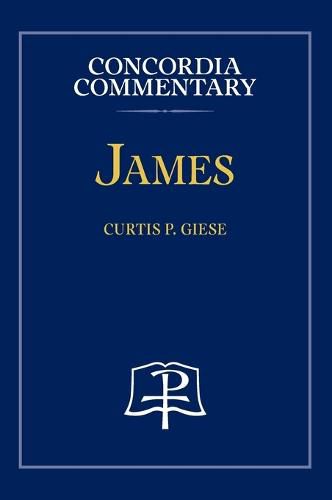Readings Newsletter
Become a Readings Member to make your shopping experience even easier.
Sign in or sign up for free!
You’re not far away from qualifying for FREE standard shipping within Australia
You’ve qualified for FREE standard shipping within Australia
The cart is loading…






This title is printed to order. This book may have been self-published. If so, we cannot guarantee the quality of the content. In the main most books will have gone through the editing process however some may not. We therefore suggest that you be aware of this before ordering this book. If in doubt check either the author or publisher’s details as we are unable to accept any returns unless they are faulty. Please contact us if you have any questions.
It could be said that the epistle of James has had a troubled history in Lutheran circles. Beyond its status as a disputed book in ancient considerations of the canon, James's apparently contradictory teaching on faith and works can seem quite troubling. In this original translation, Rev. Dr. Curtis P. Giese tackles James with a thorough, faithful commentary. He argues that the book is truly scriptural, written by James the half-brother of Christ, and that the teaching on justification is reconcilable with the rest of the scriptures. Giese treats recent scholarship, giving particular focus to the various interpretations of the structure of James, whether as a disjointed collection of semi-essays or an intentional, integrated narrative. He also extensively treats the reception of James by Luther and the Reformers in the face of pressures from the Roman church.
Features
Several escursus essays on James in Luther and Reformation thought An overview of the canonicity of James
Additional Essays
The Eschatological Focus of James Old and New Testament Connections in James Reception of James in the Early Church Luther and the Lutheran Confessions on Justification in James 2:14-26
About the series
The Concordia Commentary Series: A Theological Exposition of Sacred Scripture is written to enable pastors and teachers of the Word to proclaim the Gospel with greater insight, clarity, and faithfulness to the divine intent of the Biblical text.
The series will cover all the canonical books of the Old and New Testament, with an original translation and meticulous grammatical analysis of the Hebrew, Aramaic, or Greek of each text. The foremost interpretive lens centers on the unified proclamation of the person and work of Christ across every Scriptural book.
The Commentary fully affirms the divine inspiration, inerrancy, and authority of Scripture; Each passage bears witness to the confession that God has reconciled the world to Himself through the incarnation, ministry, death, resurrection, and ascension of Christ His Son.
Authors expose the rich treasury of language, imagery, and thematic content of the Scripture, while supplementing their work with additional research in archaeology, history, and extrabiblical literature. Throughout, God's Word emanates from authors careful attention and inculcates the ongoing life of the Church in Word, Sacrament, and daily confession.
$9.00 standard shipping within Australia
FREE standard shipping within Australia for orders over $100.00
Express & International shipping calculated at checkout
This title is printed to order. This book may have been self-published. If so, we cannot guarantee the quality of the content. In the main most books will have gone through the editing process however some may not. We therefore suggest that you be aware of this before ordering this book. If in doubt check either the author or publisher’s details as we are unable to accept any returns unless they are faulty. Please contact us if you have any questions.
It could be said that the epistle of James has had a troubled history in Lutheran circles. Beyond its status as a disputed book in ancient considerations of the canon, James's apparently contradictory teaching on faith and works can seem quite troubling. In this original translation, Rev. Dr. Curtis P. Giese tackles James with a thorough, faithful commentary. He argues that the book is truly scriptural, written by James the half-brother of Christ, and that the teaching on justification is reconcilable with the rest of the scriptures. Giese treats recent scholarship, giving particular focus to the various interpretations of the structure of James, whether as a disjointed collection of semi-essays or an intentional, integrated narrative. He also extensively treats the reception of James by Luther and the Reformers in the face of pressures from the Roman church.
Features
Several escursus essays on James in Luther and Reformation thought An overview of the canonicity of James
Additional Essays
The Eschatological Focus of James Old and New Testament Connections in James Reception of James in the Early Church Luther and the Lutheran Confessions on Justification in James 2:14-26
About the series
The Concordia Commentary Series: A Theological Exposition of Sacred Scripture is written to enable pastors and teachers of the Word to proclaim the Gospel with greater insight, clarity, and faithfulness to the divine intent of the Biblical text.
The series will cover all the canonical books of the Old and New Testament, with an original translation and meticulous grammatical analysis of the Hebrew, Aramaic, or Greek of each text. The foremost interpretive lens centers on the unified proclamation of the person and work of Christ across every Scriptural book.
The Commentary fully affirms the divine inspiration, inerrancy, and authority of Scripture; Each passage bears witness to the confession that God has reconciled the world to Himself through the incarnation, ministry, death, resurrection, and ascension of Christ His Son.
Authors expose the rich treasury of language, imagery, and thematic content of the Scripture, while supplementing their work with additional research in archaeology, history, and extrabiblical literature. Throughout, God's Word emanates from authors careful attention and inculcates the ongoing life of the Church in Word, Sacrament, and daily confession.